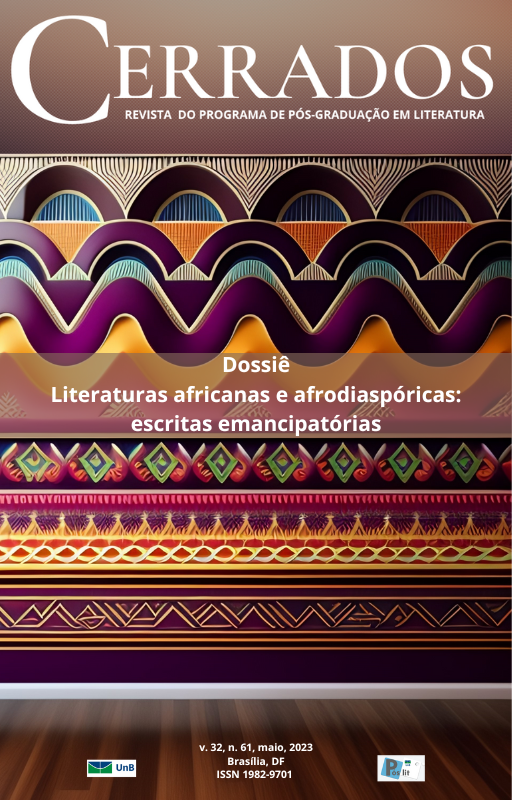Cabelo e relações raciais na construção de uma personagem mulher e negra em Americanah de Chimamanda Adichie
DOI:
https://doi.org/10.26512/cerrados.v32i61.45849Palavras-chave:
cabelo, identidade, Literatura Africana, Chimamanda AdichieResumo
O objetivo deste artigo é investigar como o cabelo de Ifemelu, personagem principal do romance Americanah, de Chimamanda Adichie, pode ser visto como uma estratégia para questionar o padrão branco imposto às pessoas negras, tanto em termos estéticos quanto em termos de vivências. Demonstra as complicadas relações raciais estabelecidas no romance e compreende o significado da descoberta da raça por Ifemelu e suas consequências em sua vida, suas experiências e sua relação com seu corpo – especialmente seu cabelo – e seu eu.
Downloads
Referências
ADICHIE, Chimamanda Ngozi. Americanah. New York: Anchor, 2013.
BANKHEAD, T.; JOHNSON, T. A. Hair it is: examining the experiences of Black women with natural hair. Open Journal of Social Sciences, v. 2, p. 86-100, 2014. Available at: http://dx.doi.org/10.4236/jss.2014.21010. Access on: 25 Nov. 2020.
BRAGA, Cláudio R. V. A literatura movente de Chimamanda Adichie: pós-colonialidade, descolonização cultural e diáspora. Brasília: Universidade de Brasília, 2019.
CRUZ-GUTIÉRREZ, C. Hair politics in the blogsphere: safe spaces and the politics of self-representation in Chimamanda Adichie’s Americanah. Journal of Postcolonial Writing, v. 55, n. 1, p. 66-79, 2019. Available at: https://doi.org/10.1080/17449855.2018.1462243. Access on: 21 Nov. 2020.
FANON, Frantz. Black skins, white masks. Translated by Charles Lam Markmann. London: Pluto, 2008.
FRIEDMAN, Susan Stanford. Mappings: feminism and the cultural geographies of encounter. New Jersey: Princeton University, 1998.
FRIEDMAN, Susan Stanford. The “new migration”: clashes, connections, and diasporic women’s writing. Contemporary women’s writing, v. 3, n. 1, p. 6-27, Jun. 2009.
HALL, Stuart. A identidade cultural na pós-modernidade. Tradução Tomaz Tadeu da Silva e Guacira Lopes Louro. Rio de Janeiro: DP&A, 2001.
HOOKS, bell. Black looks: race and representation. Boston: South End, 1992.
JONES, Charisse; SHORTER-GOODEN, Kumea. Shifting: the double lives of Black women in America. Harper Collings e-books, 2003.
KILOMBA, Grada. Plantation memories: episodes of everyday racism. 2nd ed. Münster: UnrastVerlag, 2010.
LOOMBA, Ania. Colonialism/postcolonialism. New York: Routledge, 1998.
MAMI, F. De-stereotyping African realities through social media in Chimamanda Ngozi Adichie’s Americanah and Belkacem Meghzouchene’s Sophia in the white city. Postcolonial interventions, v. 2, n. 2, p. 162-197, Jun., 2017.
McCLINTOCK, Anne. Imperial leather: race, gender and sexuality in the colonial contest. New York: Routledge, 1995.
McDOWELL, Linda. Gender, identity & place: understanding feminist geographies. Minneapolis: University of Minnesota, 2003.
OYEWÙMÍ, Oyèrónké. Alice in motherland: reading Alice Walker on Africa and screeing the color ‘Black’. In: OYEWÙMÍ, Oyèrónké. (org.) African women and feminism: reflecting on the politics of sisterhood. New Jersey: Africa World, 2003, p. 159-186.
OYEWÚMÍ, Oyèrónké. The invention of women: making an African sense of Western gender discourses. Minneapolis: university of Minnesota, 1997.
Downloads
Publicado
Como Citar
Edição
Seção
Licença
Copyright (c) 2023 Revista Cerrados

Este trabalho está licenciado sob uma licença Creative Commons Attribution 4.0 International License.
Proibida a reprodução parcial ou integral desta obra, por qualquer meio eletrônico, mecânico, inclusive por processo xerográfico, sem permissão expressa do editor (Lei n. 9.610 de 19/2/1998 )



